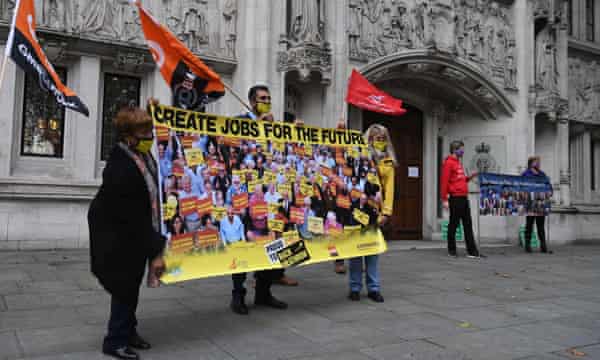The supreme court has overturned a February judgment that a third runway at Heathrow airport was illegal. It means the project can now seek planning permission, but the ultimate completion of the runway remains uncertain.
The supreme court ruling marks the latest twist in years of legal and political wrangling over the climate impact and economic benefits of expanding the airport. The decision in February was seen as historic by environmental campaigners, as it was the first significant ruling in the world to be based on the Paris climate agreement, and related cases were subsequently brought against plans to build more roads and gas-fired power plants in the UK.
The court of appeal had found the government’s approval of the runway was illegal because ministers had failed to take into account the UK’s commitments under the 2015 Paris climate accord, which requires keeping global temperature rise as close to 1.5C as possible. But following arguments by Heathrow’s lawyers, the supreme court found this was not necessary and overturned the judgment.
The ruling means the airport can now seek a development consent order, a type of planning permission for nationally significant infrastructure. This may be difficult, as it will take into consideration stricter pledges to cut emissions made recently by the UK government, which had accepted the February decision.

Since the runway was approved in 2018, the UK has committed to net zero emissions by 2050 and on 4 December it pledged to cut carbon emissions by 68% by 2030. The climate crisis is worsening as CO2 levels continue to rise in the atmosphere and international attention is focused on the UK’s actions because it will host a critical UN climate summit in November next year in Glasgow.
Before the coronavirus pandemic, Heathrow was one of the world’s busiest airports, with 80 million passengers a year. The GBP14bn third runway would bring 700 more planes a day and a big rise in carbon emissions. However, Covid-19 travel restrictions have devastated aviation and Heathrow has said the runway could be delayed by five years, having previously set 2028 as a completion date. Other observers said the third runway may now never be needed.
“I still don’t think the third runway is going to happen,” said Tim Crosland, a lawyer at Plan B, which brought the legal case against Heathrow. “The really damaging thing [about the supreme court ruling] is the precedent for the other cases.” He said the court of appeal ruling that the UK’s Paris agreement commitments must be considered had been a “really strong lever” in legal arguments against high-carbon infrastructure.
Crosland said he was considering an appeal to the European court of human Rights, an option not affected by Brexit. The verdict was under court embargo until Wednesday morning, but Crosland tweeted it on Tuesday as “an act of civil disobedience”, risking contempt of court. “I had no choice but to protest the deep immorality of the court’s ruling,” he said. On Wednesday the supreme court said it would refer Crosland to the attorney general and the Bar Standards Board for investigation.
The supreme court also overturned a parallel Friends of the Earth case. Will Rundle, head of legal at Friends of the Earth, said: “We are disappointed, but pleased that [the judgment] confirms our view that climate impacts will still need to be fully determined at planning. Heathrow airport expansion remains in doubt and harder than ever, given the [UK’s] increasingly stringent climate policy.”
“We are in this for people everywhere facing climate breakdown right now, and for the next generation who are being left to inherit a world changed for the worse,” Rundle said.
“Approving Heathrow’s third runway is a betrayal of our children’s future and incompatible with the UK’s climate commitments,” said Magdalena Heuwieser from the Stay Grounded campaign. “We condemn the reckless and irresponsible verdict. But this fight is far from over.”

Parmjit Dhanda, at the campaign group Back Heathrow, said: “This is an important moment for local communities, desperate for jobs and apprenticeships at a very hard time for our economy. It is also a huge moment for the UK as it moves towards an uncertain Brexit, but now with the confidence that international trade could be boosted by additional capacity at the country’s only hub airport. Alongside our supporters in the CBI, the TUC, it is an opportunity to progress, while also meeting the country’s carbon-reduction targets by 2050.”
Most flights from the UK are taken for pleasure and just 20% of the UK population take more than two-thirds of international flights. Critics also say the economic benefits are illusory given, for example, the estimated GBP10bn of taxpayers’ money needed to alter road and rail links to the airport, and that it would draw investment towards the south-east.
A Heathrow spokesman said: “This is the right result for the country. Only by expanding the UK’s hub airport can we connect all of Britain to all of the growing markets of the world, helping to create hundreds of thousands of jobs. Heathrow has already committed to net zero and this ruling recognises the robust planning process that will require us to prove expansion is compliant with the UK’s climate change obligations, including the Paris Climate Agreement, before construction can begin.”
The government approved the third runway in 2018, winning a large parliamentary majority. However, ministers said in February that they accepted the court of appeal judgment that it was illegal. The prime minister, Boris Johnson, has opposed the runway, saying in 2015 that he would “lie down in front of those bulldozers and stop the construction”.
Last week, the Climate Change Committee, the government’s official advisers, said there should be no airport expansion unless emissions from flights could be reduced to compensate.